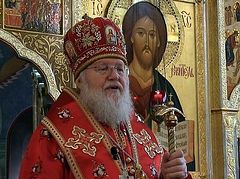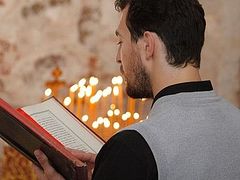Nothing portended to Sergei, a bright student of a technical school, the special path that awaited him in the near future. He was a young man of the “market” generation in twenty-first century Russia—innovative and creative, a natural leader, very outgoing and inquisitive, and a connoisseur of films. The successful IT manager’s career prospects in some technology park with nanotechnologists were obvious. Along with his intellectual and psychological strengths, Sergei also had natural and clearly visible faults—arrogance and obstinacy as the consequence of his morbid vanity and ambition to always be the leader, an acute sense of fairness against a background of perfectionism, and a touchiness, lingering sadness that proceeded from the foregoing. All of these weaknesses would have had no particular bearing on the bright young programmer’s future, but God had other plans.
One day his mother, a parishioner of one of the city’s churches, asked Sergei to help the parish priest. They needed a night guard for the church. Sergei never refused his mother whom he dearly loved, and soon into the piggy bank of the unstoppably active student was added the job of night guard in a church with a superlative library. Questions about the meaning and impermanence of earthly existence had stolen into his young heart and often visited the youth. Here in the empty semi-darkness of the sleeping church, by the light of a table lamp spotted on the pages of patristic works and ascetic homilies about spiritual perfection, these main questions of life began to receive divinely revealed answers in Sergei’s consciousness. The Lord touched his heart, and the rapid religious engagement of a man emerging from the watery depths of meaningless daily vanities and at last breathing in the saving air of Truth, became inevitable. The desire to find a spiritual guide and to attend the altar, along with with lofty thoughts of priestly service, began to gradually make themselves known, and these feelings were sincere and unyielding. But Sergei’s wise spiritual father, that very priest of “mama’s” church, restrained the impulsive youth.
“After you finish the military courses in your institute you can serve in the army as an officer. Go and serve your motherland, and at the same time you’ll test your desire to serve God, to see if it hasn’t faded away with time,” batiushka humbly advised him.
Sergei’s service in the air force was both interesting and military-monotonous. It did not at all enable his spiritual growth, but to the contrary rooted more deeply in him all the sinful things living in him from his early years. Without even noticing how his “term” went by, Sergei remained in the military base on contract and reached the rank of captain. Meanwhile, throughout all these years his thoughts of the priesthood never left him and bore a certain strange, impulsive and vocative character.
One fine day, the kind of day that probably happens in the life of every future priest, Sergei made a decisive and irrevocable step. He submitted his passport for resignation into the reserves and with his seriously ill wife and daughter returned to his hometown. That same year he submitted his request to enter the seminary located in his town, at which the ruling bishop was pleasantly surprised. Not very often did he meet among the seminary candidates for on-location study not a beardless high school graduate but an adult, fully formed family man and young officer.
Sergei already knew much of what was taught in the school program; his studies went easy for him, and he felt drawn most of all to spending time with experienced teachers and pastors. Sergei became Father Sergiy1 during the second year, having been ordained a deacon. After a short time, the bishop proposed that he be ordained a priest.
“Batiushka, I’m not ready; I’m sinful and proud, vain, audacious and quarrelsome,” Fr. Sergei openly admitted to his spiritual father.
“Don’t worry,” his confessor comforted him. “Do this: at your ordination, when the bishop places his hand on your head with the prayer invoking the Holy Spirit—at that moment ask God for everything you want that is spiritual and beneficial; and believe that it will all come true. Don’t doubt it.
And that is what Fr. Sergei did. During his ordination he asked God for what he considered the three most important and needed things. “O God, heal my matushka (wife), humble me, and send me to serve in a quiet and beautiful place, because I love nature and have loved travelling around Russia from childhood.”
The priestly service is difficult, and without God’s help it is impossible for a man to bear it. It is no coincidence that at ordination a cross is hung upon the new priest’s neck for all to see—a symbol of the victory of life over death, and of the Savior’s way of the Cross. Be thou an example of the believers, in word, in conversation, in charity, in spirit, in faith, in purity (1 Tim. 4:12), are the words of the apostle inscribed on this cross. The path of God’s priest is filled with temptations and sorrows, which heal both the pastor and his flock. Such trials also awaited Fr. Sergei.
Only a couple of years of his priesthood had passed before Fr. Sergius fell seriously out of favor with his bishop. He is silent on the details of this disgrace, but the fact remains: The Bishop gave orders that Priest Sergiy be relieved of his duties as rector of a prosperous church in the city, which left him without any service or means of subsistence for eight long months, and sent him to build a church in one of small villages in the province. Now a quiet and beautiful rural corner for summerhouses, it was once a regional center hidden from human eyes among the wooded hillocks of central Russia. He was transferred to create a church in a half-ruined log house that used to be the village administration. The hamlet was depressed, there were no jobs there, and it ceased to attract dacha owners due to the gypsy band that had settled there, but this location on the tall banks of a deep river covered with thin birch groves and a dense spruce forest has long been appreciated by tourists and true lovers of picturesque nature. For its similarity to the Lower Alps, visitors began calling this land a local Switzerland.
 A pectoral cross from Tsarist times with a monogram from Emperor Paul, gifted to the abbot of one monastery.
A pectoral cross from Tsarist times with a monogram from Emperor Paul, gifted to the abbot of one monastery. One day Fr. Sergiy went to his spiritual father in despair, took off his pectoral cross, placed it on the holy table and said in tears, “I can’t go on, father. The cupboard is bare at home, and I don’t have any way to feed my children. I am a healthy man, but I can’t support my family. I’ll leave the priestly service and get a secular job.
The young pastor’s spiritual father again comforted him, this time without words. He looked at him affectionately, placed the cross back on his chest, and gave him material support. Later he would often send him financial help.
“The Lord gave me everything I asked for at my ordination,” Fr. Sergiy said as he shared this story with me over a cup of coffee in a railway station café. “I boldly asked, “Lord, humble me,” and God gave me a darn good humbling. I didn’t serve the Liturgy for nearly a year, and for a priest this is like death. I asked to serve in a quiet, beautiful place, and now I’m serving in a local Swiss Alps. But the main request our loving God fulfilled is that my matushka has not had any bouts of her illness for eight years now. There you have it!
It is good for me that Thou hast humbled me (Ps. 118:71), were the Psalmist’s words that came to my mind, and after a big hug, we parted.





